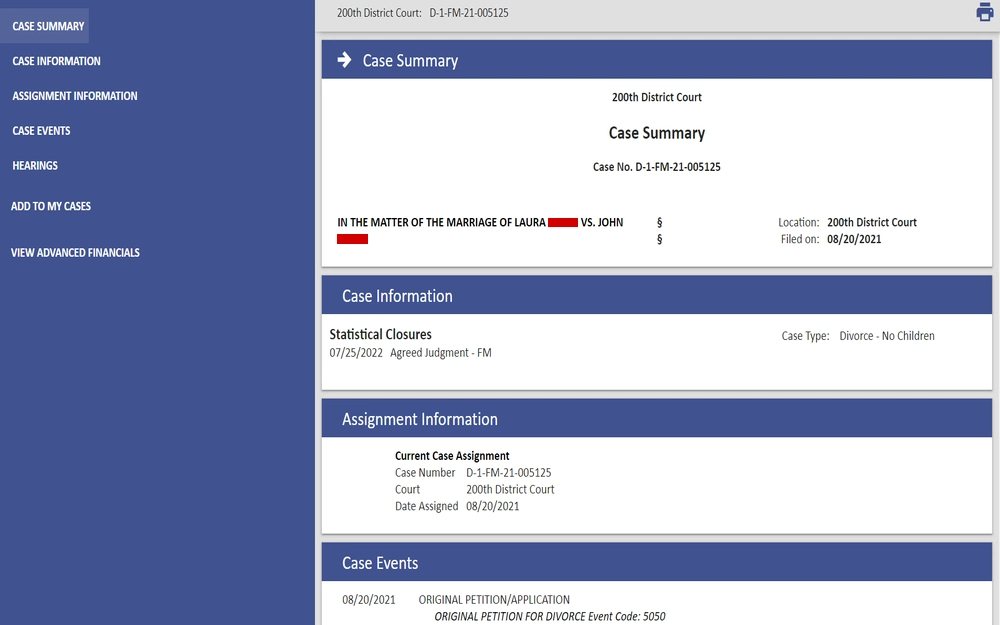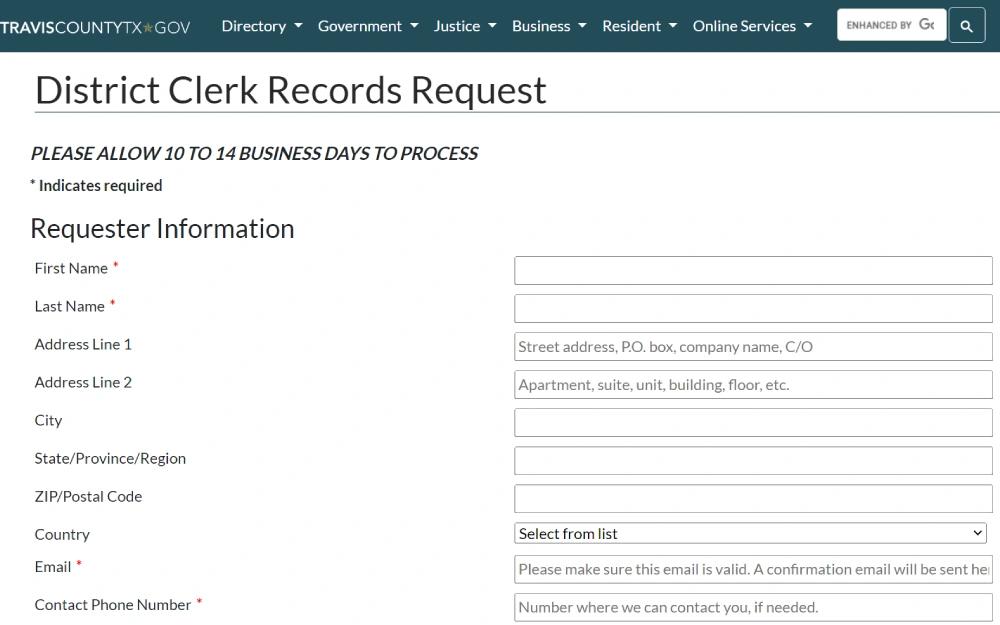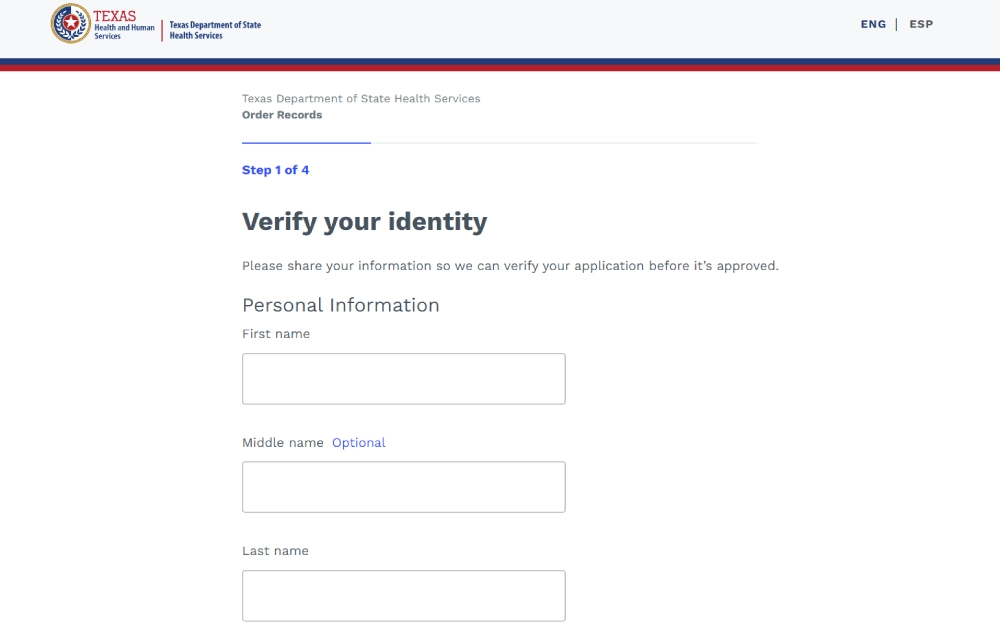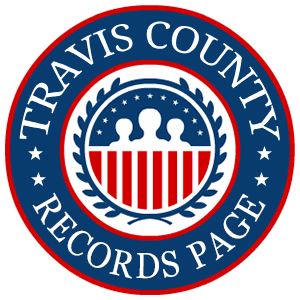Search free Travis County divorce records seamlessly using the guidance throughout this article.
County, city, and state-level agencies assist interested citizens in conducting such a records search in the district. Searchers can expect a wide range of information to be present in divorce records, such as the primary details of the divorcees, the circumstances of the separation, and details on other legal matters the case might involve, such as child custody or alimony.
This streamlined resource covers how to efficiently conduct a divorce records search in Travis County, Texas, free of charge using various official sources.
How To Track Down Free Travis County Divorce Records
Divorce records in Travis County, Texas can be obtained through the District Clerk’s Department.1 Through its online webpage, the department has made it extremely convenient for citizens to search divorce records of separations that happened in the county. Interested residents can use the department’s online web portal to look up divorce records.
Records of divorces that took place as early as December 2005 to now are available through this portal. The search tool is free to use and does not require any kind of registration.
Furthermore, there is also a complete user guide that is provided by the department on how to use the public search portal in the best way for the most precise results. Using the smart search option available on the portal, researchers can look up divorce papers through case numbers or the names of the divorcees.2
For more accurate results, researchers can search for records using the advanced search options provided. Records can be searched by their location (district clerk, county clerk, probate court, or all). Furthermore, different search types can be used in which residents can use various search criterias.

For example, divorce records can be searched by attorney name, attorney bar number, judicial officer, citation number, and case cross-reference number. In addition to that, there are different kinds of filters that can be added to further narrow down the search. In case any citizen has a query or confusion, they can check out the tool’s FAQ page.3
The database of this search tool is updated regularly so that researchers can have access to the most up-to-date records. However, the tool only provides basic information about the divorce case, such as the location where it took place, time of separation, primary details of divorcees, and case status. For detailed information on the case, interested individuals will have to order divorce records from the District Clerk’s Department.
Records can be ordered online, via mail, or by an in-person visit to the department’s main office. In all three methods, a formal Records Request Form will have to be filled out and submitted to the department.4

In case a citizen wants to request divorce records by mail, they will have to send the form to the following address:
Travis County District Clerk
Formal Records Request
P.O. Box Number 679003
Austin, Texas 78767
Phone: 512-854-9188
Email: [email protected]
Interested residents can also order divorce records by directly visiting the County District Clerk – Civil and Family Court Facility.
Civil & Family Court Facility – Travis County
1700 Guadalupe Street
Austin, Texas 78701
Phone Number: 512-854-9457
Email: [email protected]
The office of the Civil & Family Court Facility is open from 8 AM to 5 PM, Monday to Friday, and citizens can visit and request a divorce records search anytime during these hours (note that the department is officially closed during weekends and other public holidays).
Requests usually take around 7 to 14 days to process, after which the records are sent to the requestor on their provided details. The Department of the District Clerk charges a fee of $5 per item searched, whether it is a name or case number.
Certificates of divorce cost $10, whereas paper documents cost $1 per page. In case the requested records are to be sent through mail, a $3 delivery fee is charged, and electronic copies are charged as $.10 per sheet.
Divorce records can also be searched and ordered from the Travis County Clerk’s Department.5 This agency also uses the same online search tool as the one used by the District Clerk’s Department, which citizens can use for free to look up case records.
Additionally, divorce records can also be requested by mail or by an in-person visit to the department’s main office:
Travis County Clerk – Main Office
5501 Airport Boulevard
P.O. Box Number 149325
Austin, Texas 78751
Phone: 512-854-9188
Email: [email protected]
The office is open during regular weekdays, Monday through Friday, 8 AM to 5 PM. The cost of divorce records copies, both electronic and hard, is $1 per page. Certification costs $5 with an additional $1 per page.
How To Search Statewide Divorce Records via the Texas Department of State Health Services
While searching for divorce records in Travis County, there could be instances where the records are actually present in a different county’s agency or a state-level department. In such a case, residents must know of the relevant source to search all Texas divorce records.
The Texas Department of State Health Services can help interested individuals in conducting a state-level divorce records search. The divorce indexes are arranged by year in the form of indexes and contain details of all marriage dissolutions that took place as early as 1968.6
These indexes contain a wide range of information about divorce cases, such as the name of the divorcees, separation date, case number, age of the divorcees, name and code of the county where the order is filed, and names of minor children.
The department can be called at 512-776-7111 (toll-free number 888-963-7111) or emailed at [email protected] in case a resident has queries or is facing difficulty in accessing the divorce indexes. Furthermore, citizens can also choose to order public divorce records from the State Health Department.7 The orders are processed, and record deliveries are made within 20 – 25 days.

Older divorce records can be searched for ancestry, lineage, and genealogy purposes.
For records of divorces that took place before 1968, interested researchers must contact the District or County Clerk of the county in which the separation originally happened.
Who Can Review Divorce Records in Travis County?
Yes, anyone can look up a person’s divorce records (even if common law), as these are considered court records. In Texas, court records are considered public records according to the Public Information Act (formerly the Open Records Act).9 However, not every detail about the divorce is available to the general public.
Divorce records usually contain the marriage dissolution certificate, case files, and the final court-issued decree. The marriage dissolution or divorce certificate is a simple legal declaration of the separation. On the other hand, a divorce decree is the court’s complete order in regard to a separation and can contain information on matters such as alimony, division of assets, and child support.
Divorce certificates are readily available to the general public. However, there may be complexities (for unrelated people) in obtaining the complete case decrees, which are only available to the people related to the case or blood relatives of the divorcees.
Third-party sources can also be used to search divorce records in Travis County as they use government resources. However, unless a government agency endorses these sources, the information obtained through them should not be used for official matters.
This resource has complete details on how to perform a free Travis County divorce records search effectively and without hassle.
References
1Travis County District Clerk. (2024, January 22). District Clerk. Retrieved February 19, 2024, from <https://www.traviscountytx.gov/district-clerk>
2Travis County District Clerk. (n.d.). Case Information Online. Retrieved February 19, 2024, from <https://odysseyweb.traviscountytx.gov/Portal/Home/Dashboard/29>
3Travis County District Clerk. (n.d.). FAQ for Attorneys [PDF]. Retrieved February 19, 2024, from <https://www.traviscountytx.gov/images/odyssey/FAQ-Attorneys.pdf>
4Travis County District Clerk. (n.d.). Records Request. Retrieved February 19, 2024, from <https://www.traviscountytx.gov/district-clerk/records-request>
5Travis County Clerk. (n.d.). Search Copies of Records. Retrieved February 19, 2024, from <https://countyclerk.traviscountytx.gov/departments/recording/search-copies-of-records/>
6Texas Department of State Health Services. (n.d.). Marriage and Divorce Indexes. Retrieved February 19, 2024, from <https://www.dshs.texas.gov/vital-statistics/marriage-divorce-records/marriage-divorce-indexes>
7Texas Department of State Health Services. (n.d.). Order Vital Records. Retrieved February 19, 2024, from <https://ovra.txapps.texas.gov/ovra/order-vital-records>
8Texas Department of State Health Services. (n.d.). Order Divorce Verification Letter. Retrieved February 19, 2024, from <https://ovra.txapps.texas.gov/ovra/order-divorce-verification-letter>
9Texas Attorney General. (n.d.). Overview of the Public Information Act. Retrieved February 19, 2024, from <https://www.texasattorneygeneral.gov/open-government/members-public/overview-public-information-act>
